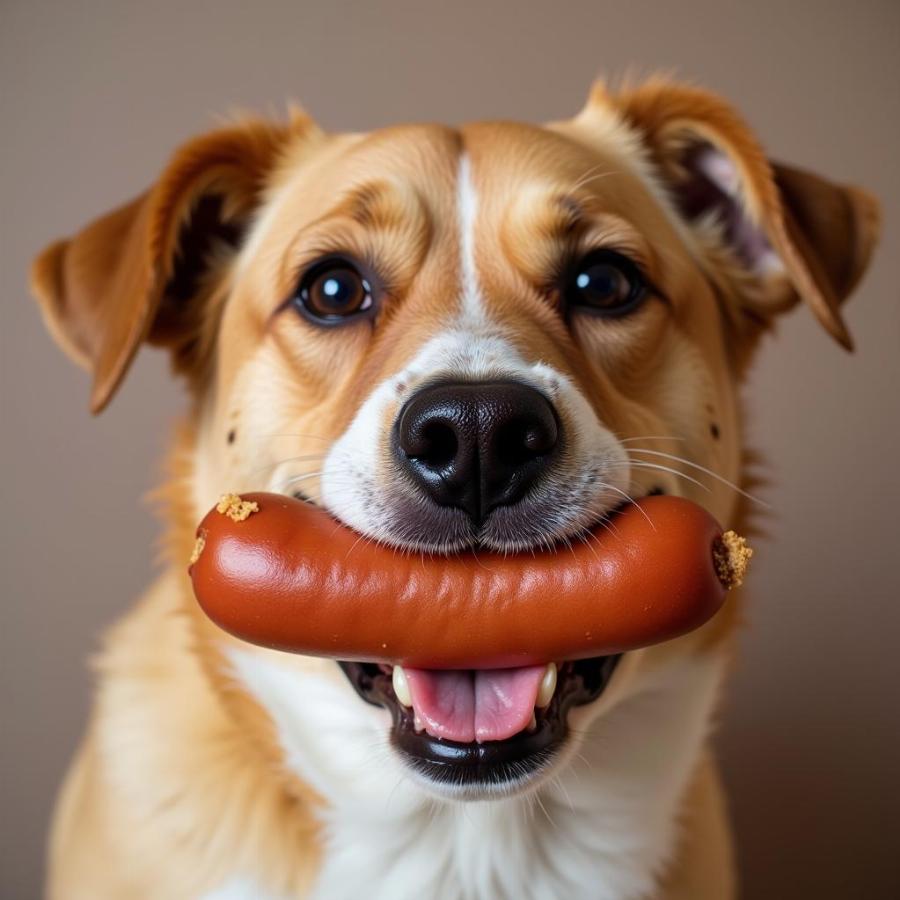Hot dogs, a classic American favorite, might tempt you to share a bite with your canine companion. But traditional hot dogs are loaded with sodium and other ingredients that aren’t healthy for dogs. So, how do you cook hot dogs in the oven to make them a safe and delicious treat for your furry pal? This article will guide you through creating healthy, oven-baked hot dogs for your beloved pet, offering valuable insights into canine nutrition and safe treat preparation.
Baking Hot Dogs for Your Dog: A Healthier Approach
While offering your dog a bite of your hot dog might seem harmless, regular hot dogs contain high levels of sodium and preservatives that can be detrimental to their health. Baking plain, low-sodium hot dogs in the oven is a much healthier way to prepare this occasional treat. This method reduces the fat content and ensures they’re cooked through, eliminating any potential bacteria. Remember, treats should only make up a small portion of your dog’s daily diet.
Choosing the Right Hot Dogs for Your Dog
Not all hot dogs are created equal. When choosing hot dogs for your dog, opt for low-sodium or no-sodium varieties. Avoid hot dogs with added nitrates, nitrites, or artificial flavors. Beef, chicken, or turkey hot dogs are generally acceptable, but always check the ingredient list carefully.
Step-by-Step Guide to Baking Hot Dogs for Your Dog
Baking hot dogs in the oven is a simple process:
- Preheat your oven to 350°F (175°C).
- Place the hot dogs on a baking sheet lined with parchment paper. This prevents sticking and makes cleanup easier.
- Bake for 10-15 minutes, or until the hot dogs are heated through and lightly browned.
- Let the hot dogs cool completely before giving them to your dog.
- Serve in moderation. Remember, treats should only be a small part of your dog’s overall diet.
 Dog eating baked hot dogs
Dog eating baked hot dogs
Can Dogs Eat Hot Dog Buns?
While the hot dog itself, prepared correctly, can be an occasional treat, hot dog buns are generally not recommended for dogs. They offer little nutritional value and can contribute to weight gain. Stick to the plain, baked hot dog as a treat.
Homemade Dog Treats: A Healthier Alternative
While baked hot dogs can be a safe occasional treat, making homemade dog treats allows you to control the ingredients completely. Recipes using whole foods like sweet potatoes, carrots, and lean meats provide a more nutritious and wholesome option. homemade dog food for pancreatitis
What If My Dog Eats a Regular Hot Dog?
If your dog accidentally snags a bite of a regular hot dog, don’t panic. A small amount is unlikely to cause serious harm, but monitor them for any digestive upset. If they exhibit vomiting, diarrhea, or lethargy, contact your veterinarian immediately.
In conclusion, learning how do you cook hot dogs in the oven for your dog offers a healthier way to share this classic treat. By choosing low-sodium varieties and baking them until cooked through, you can provide a safe and tasty snack for your furry friend. Remember moderation is key, and homemade treats are always the most nutritious option.
FAQ:
- Can puppies eat hot dogs? No, puppies have sensitive stomachs, and hot dogs are not recommended.
- Are there any hot dogs specifically made for dogs? Yes, some pet stores sell dog-specific hot dogs, but always check the ingredients.
- Can I add cheese to my dog’s baked hot dog? While a small amount of cheese is generally okay, it’s best to keep the treat plain and low-fat.
- How often can I give my dog a baked hot dog? Baked hot dogs should be given as an occasional treat, not a regular part of their diet.
- What are some signs of a food allergy in dogs? Signs include itching, skin rashes, vomiting, and diarrhea.
- Can I freeze baked hot dogs for my dog? Yes, you can freeze baked hot dogs for later use.
- What other human foods are safe for dogs? Small amounts of cooked chicken, plain rice, and certain fruits and vegetables can be safe for dogs.
Related Articles:
Beaut Dogs is your trusted source for all things dog-related. We provide expert advice and resources on dog breeds, care, training, and nutrition. If you have any further questions, please contact us at Email: [email protected] for detailed and accurate information. Beaut Dogs is dedicated to helping you provide the best possible care for your beloved canine companion. Visit us at https://beautdogs.com!